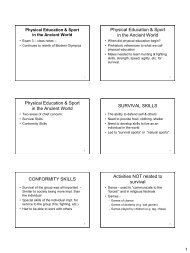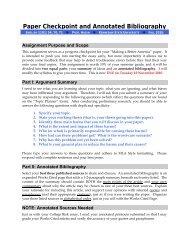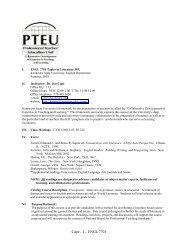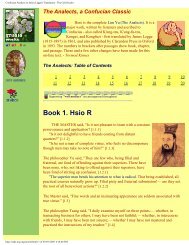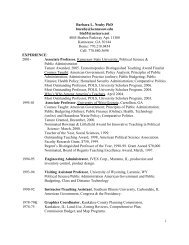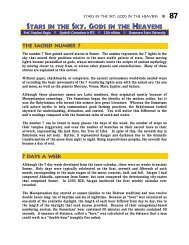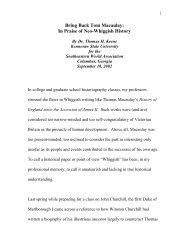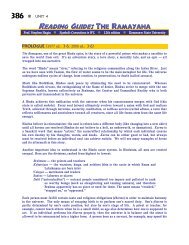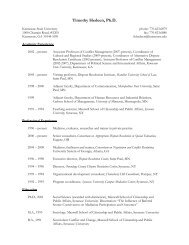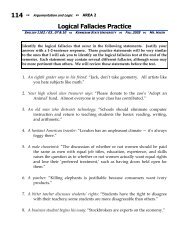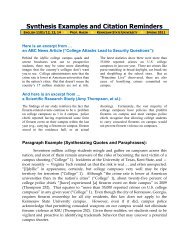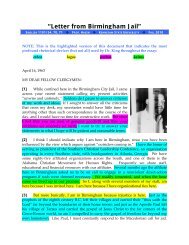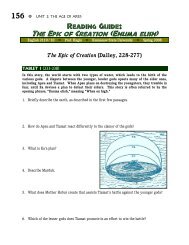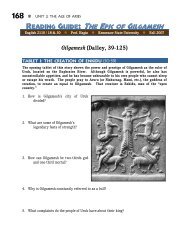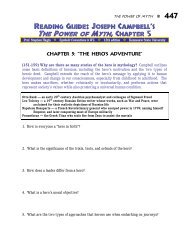Reading Guide: The Epic of Gilgamesh - KsuWeb - Kennesaw State ...
Reading Guide: The Epic of Gilgamesh - KsuWeb - Kennesaw State ...
Reading Guide: The Epic of Gilgamesh - KsuWeb - Kennesaw State ...
Create successful ePaper yourself
Turn your PDF publications into a flip-book with our unique Google optimized e-Paper software.
138 K UNIT 2<br />
9. Why does <strong>Gilgamesh</strong> suggest sending a sacred temple prostitute, Shamhat, to meet<br />
Enkidu?<br />
10. Shamhat, the sacred prostitute, is sent to “lie with” Enkidu and to “teach him.” For “six<br />
days and seven nights,” what does Enkidu learn?<br />
11. How do the animals treat the newly transformed Enkidu?<br />
12. Why does Shamhat tell Enkidu that he has become “like a god”?<br />
13. What does Enkidu want to do to <strong>Gilgamesh</strong> before Shamhat convinces him otherwise?<br />
14. What do <strong>Gilgamesh</strong>’s two dreams signify?<br />
15. Why does Ninsun tell <strong>Gilgamesh</strong> that he will love Enkidu “as a wife”?<br />
16. Why is Ninsun an appropriate character to interpret <strong>Gilgamesh</strong>’s dreams?<br />
Tablet II: <strong>The</strong> Challenge (59-63)<br />
If you have read this story before, you may have read it<br />
in the popular prose version by translator N. K. Sandars.<br />
This prose version uses some different tablets than the<br />
Dalley version, which is far more authentic and updated<br />
(although harder to read). In Dalley’s version, Ishhara,<br />
goddess <strong>of</strong> marriage and childbirth, is being prepared to<br />
marry <strong>Gilgamesh</strong> to provide a balance in his life. In the<br />
Sandars version, the people <strong>of</strong> Uruk attempt to marry him<br />
to the Goddess <strong>of</strong> Love (Ishtar).<br />
Enkidu arrives in Uruk to compete with <strong>Gilgamesh</strong>. At<br />
the moment when <strong>Gilgamesh</strong> is about to enter the house<br />
<strong>of</strong> his bride’s father, Enkidu arrives and blocks<br />
<strong>Gilgamesh</strong> from entering the door. <strong>The</strong>y wrestle, but in<br />
the process they discover that each man complements the<br />
other, thus making them “whole.” Do not look at this<br />
too literally.<br />
Metaphorically, each <strong>of</strong> their characteristics helps to<br />
place the other’s traits into a better and healthier<br />
balance. Notice that <strong>Gilgamesh</strong> and Enkidu form a<br />
complete person by unifying their dual natures — Enkidu<br />
represents nature (feminine force) while <strong>Gilgamesh</strong><br />
represents civilization (male force). Enkidu becomes the<br />
yin to <strong>Gilgamesh</strong>’s yang.<br />
Interestingly, after the fight is over, Enkidu breaks down<br />
crying. He begins talking about a creature named<br />
Humbaba, the keeper <strong>of</strong> the Pine Forest <strong>of</strong> Lebanon.



